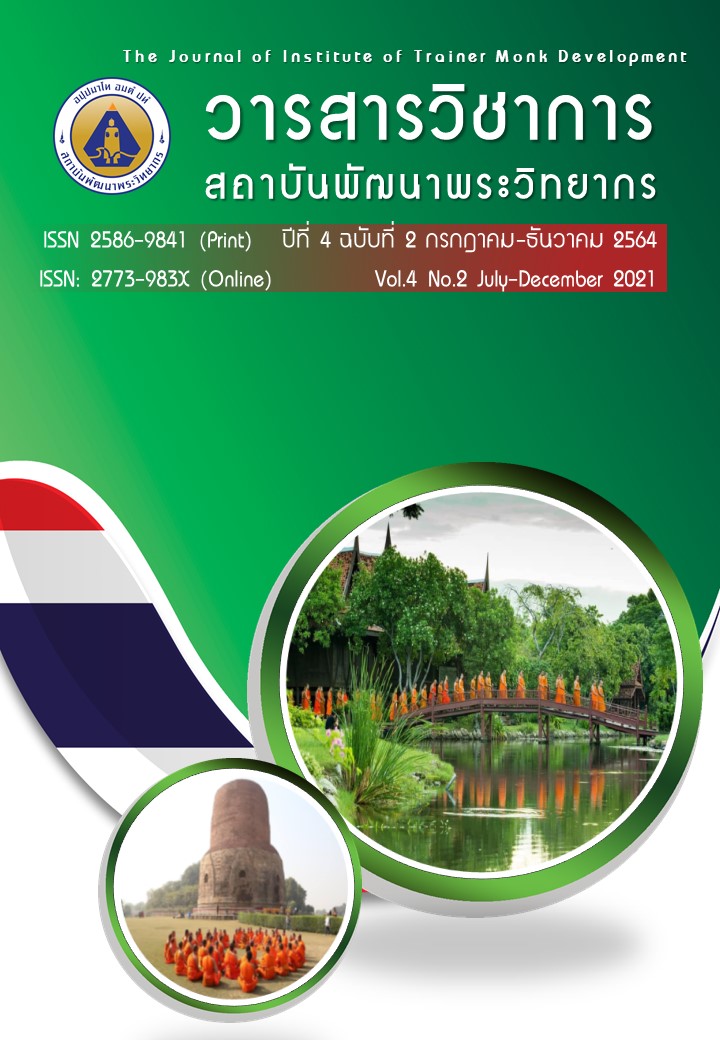Buddhist Approach and Measures to Prevent and Solve the Problem of the epidemic Covid-19
Main Article Content
Abstract
This article aims to present a Buddhist approach and measures to prevent and solve the problem of the epidemic COVID-19. Using studies from documents related books and articles be described according to the phenomenon that has occurred in particular, the coronavirus disease 2019: (COVID-19) has a widespread outbreak in the People's Republic of China. Since December 2019, it is considered a new disease that does not have a vaccine that can fully fight the infection. However, when such a disease occurs it is necessary to find a variety of methods of prevention and correction. As in this article The Buddhist principles concerning conduct, the 4 meditation principles and the 3 S. principles have been used as a guideline for living in the midst of the disease that arises. It will enable living in the midst of abnormalities of disease with consciousness, wisdom, knowing, knowing, not being too scared to be able to overcome this crisis safely and securely.
Article Details
บทความที่ได้รับการตีพิมพ์เป็นลิขสิทธิ์ของวารสารวิชาการสถาบันพัฒนาพระวิทยากร
ข้อความที่ปรากฎอยู่ในบทความที่ได้รับการตีพิมพ์ในวารสาร ถือเป็นความรับผิดชอบของผู้เขียนบทความ และข้อคิดเห็นนั้นไม่ถือว่าเป็นทัศนะและความรับผิดชอบของกองบรรณาธิการวารสารวิชาการสถาบันพัฒนาพระวิทยากร
References
กรมควบคุมโรค. (2563). 5 สัญญาณเตือนอาการ. สืบค้นเมื่อวันที่ 21 มิถุนายน 2564, จากhttp://www.govesite.com/ratchasan/activities.php?aid=20200203154456kuynkZp
กรมควบคุมโรค. กระทรวงสาธารณสุข. (2563ก). คู่มือการป้องกันและควบคุมโรคติดเชื้อไวรัสโคโรนา 2019 สำหรับประชาชน. กรุงเทพฯ: โรงพิมพ์ชุมนุมสหกรณ์การเกษตรแห่งประเทศไทย.
กองโรคติดต่อทั่วไป. (2564). แนวทางการเฝ้าระวัง ป้องกันและควบคุมโรคติดเชื้อไวรัสโคโรนา 2019. กรุงเทพฯ : กองโรคติดต่อทั่วไป.
ไชยยา เรืองดี. (2564). พระพุทธศาสนากับการบรรเทาสถานการณ์โรคโควิด – 19. วารสารปัญญาพัฒน์. 56(1), 56-57.
บัญชา เกิดมณี และคณะ. (2563). แนวคิดและทิศทางการแก้ปัญหาโควิด-19. วารสารก้าวทันโลกวิทยาศาสตร์, 20(1), 1-12.
บีบีซีนิวส์ไทย. (2563). ไวรัสโคโรนา : ที่มา อาการ การรักษา และการป้องกันโรคโควิด - 19. เรียกใช้เมื่อ 21 มิถุนายน 2564 จาก https://www.bbc.com/thai/features-51734255
พระครูสุภัทรวชิรานุกูลและ เยื้อง ปั้นเหน่งเพชร. (2564). COVID-2019: โอกาสและวิธีการพัฒนาตนเองตามแนวพระพุทธศาสนา. วารสาร มจร พุทธปัญญาปริทรรศน์, 6(2), 216.
พระพรหมคุณาภรณ์ (ป.อ.ปยุตโต). (2539). การพัฒนาที่ยั่งยืน. กรุงเทพฯ: มูลนิธิโกมลคีมทอง.
พระพรหมคุณาภรณ์ (ป.อ.ปยุตโต) (2545). พจนานุกรมพุทธศาสตร์ ฉบับประมวลธรรม.พิ มพ์ครั้งที่ 10. กรุงเทพฯ: โรงพิมพ์มหาจุฬาลงกรณราชวิทยาลัย.
พระมหาสุริยะ มทฺทโว. (2564). การประยุกต์หลักพุทธธรรมเพื่อเป็นแนวทางการรับมือปัญหาโรคระบาด COVID-19. วารสาร มจร สังคมศาสตร์ปริทรรศน์. 10(1), 325.
มหาวิทยาลัยมหาจุฬาลงกรณราชวิทยาลัย. (2539). พระไตรปิฎกภาษาไทย ฉบับมหาจุฬาลงกรณราชวิทยาลัย. กรุงเทพมหานคร โรงพิมพ์มหาจุฬาลงกรณราชวิทยาลัย.
ไพเราะ มากเจริญ. (2564). ดูแลกายและใจ ตามหลักพุทธศาสนาในสถานการณ์โควิด-19. สืบค้นเมื่อวันที่ 21 สิงหาคม 2564, จาก https://www.posttoday.com/politic/columnist/660601
สํานักงานคณะกรรมการสุขภาพแหงชาติ. (2563). รวมพลังพลเมืองตื่นรูชวยชาติสูภัยโควิด-19 : แนวปฏิบัติในการปองกันและเฝาระวังโรคโควิด 19 ในชุมชน. นนทบุรี: บ.สามดีพรินติ้งอีควิปเมนทจํากัด.
World Health Organization. (2020). Coronavirus disease (COVID-19) pandemic. Retrieved June 25, 2021, from https://www.who.int/emergencies/diseases/novel-coronavirus-2019.


